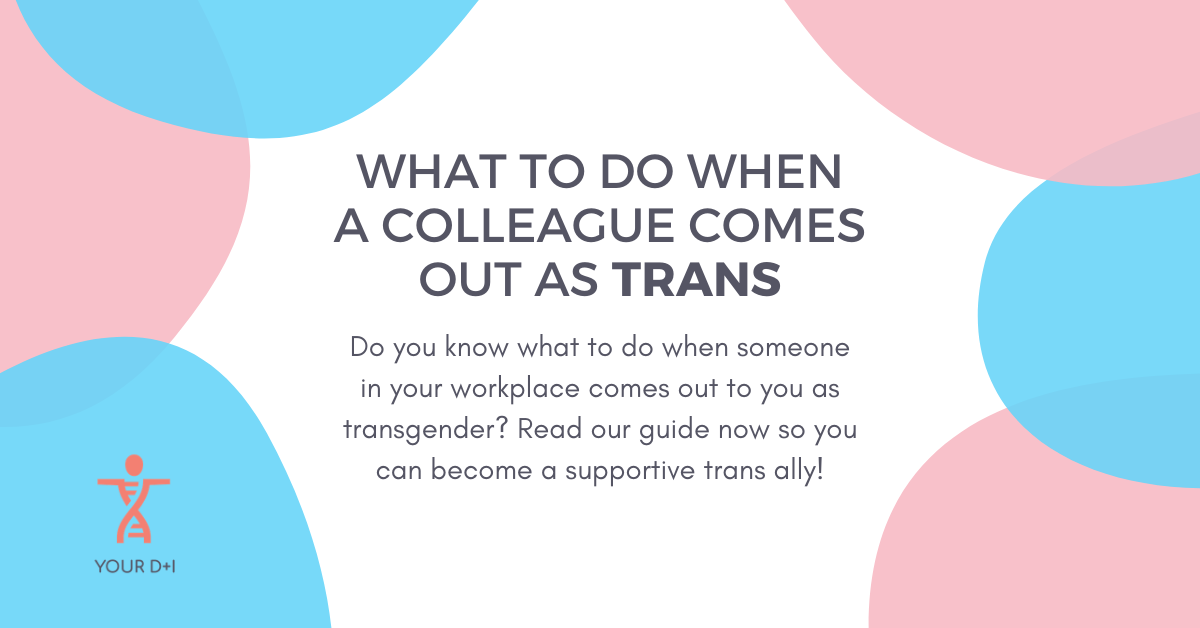What To Do When a Colleague Comes Out as Trans
Coming out can be a difficult but exciting time for a trans person. If you are lucky enough that a trans colleague decides to confide in you, you may wonder how you can best support them. This guide will advise you on what to do if you are one of the first in your workplace your colleague has come out to, whether they are yet to transition or are even ‘stealth’ (more on this term later).
What should I say?
When your colleague lets you know they’re trans, you may not know how best to react. Sometimes, the smaller the reaction, the more acceptance you convey. Making a big deal could get you both unwanted attention or just make your colleague feel embarrassed. Unless you are friends, you may want to stick to just thanking them for telling you.
It may also be a good idea to offer them your support if they ever need it. Whether or not you are their manager, you can let them know you are there for them. You could also offer them help with more specific areas, but you will first need to consider the situation.
What is their situation?
The first thing to think about after you’ve been confided in is the current situation your colleague is in. Is the gender they came out to you as different to the one people know them as around the office? Or did they tell you that their transition happened in the past?
If you’re unsure, ask them to clarify. However, avoid phrases like ‘did you use to be a man?’ Instead you can say ‘were you assigned male at birth?’ In place of saying ‘when you were a she’, you can simply say ‘before your transition’. This will help you be more respectful of your colleague’s gender.
What is ‘stealth’?
Your colleague may have let you know that they are trans but have already transitioned. The pronouns and name you use for them probably already reflect their gender identity, and nobody knows that they weren’t assigned their correct gender at birth. This is often referred to in the trans community as being ‘stealth’. However, most don’t recommend cisgender (non-trans) people use this word at it implies that trans people who aren’t out are being secretive.
If someone does let you know that they’ve transitioned in the past, this is how you can support them:
– Do not tell others that your co-worker is trans unless they give you permission.
– Don’t change how you to talk to and about them! Carry on using their usual pronouns and name.
– Never ask them about their old name, also known as a ‘dead name’ in the community.
– Do not ask invasive questions about the time before their transition. If they want to tell you, they will.
– Never ask them about what surgeries they’ve had or about their sexual anatomy. If you wouldn’t ask a cisgender person, it’s probably rude to ask a trans person.
Transitioning
If your colleague has come out to you as a different gender to the one you know them as, they may want to transition. Transitioning is a very personal experience and is different for every trans person. While many people immediately think of gender reassignment/affirming surgeries as transitioning, most trans people also transition socially. This usually involves coming out to the people around you and changing your pronouns and name.
In order to best support them, it might be useful to have an idea of their transition goals, such as if they would like to come out at work. This way, you can offer your support when they are ready to do this.
Setting boundaries
Understanding your colleague’s situation might help you, but remember to be respectful. Try not to bombard them with lots of questions they haven’t asked for. Also avoid the inappropriate topics we’ve previously mentioned.
For example, you can ask if they would like you to use a new name and pronouns for them. However, make sure to ask who you are allowed to use these new words around. This will prevent you from accidentally outing them to colleagues.
Assisting their coming out
If your co-worker asks for your help with coming out to the rest of the office, this help could come in many forms. Depending on the person, they may want to come out to each of their colleagues individually, announce it at a meeting or even do it over email.
There are ways you can support them in each of these situations. If your colleague is coming out to each person, ask if they would like you to coming along. If they would like to have a meeting or group email sent out, offer to help set this up.
Your co-worker may let you know they want to come out by themselves. In this case, you should respect their wishes and leave them to it. You can still support them from the crowd.
Final thoughts
One thing to remember when it comes to supporting a trans colleague is to never out them. The only situation where you should be telling others that they are trans is if they have asked you to.
Other than that, however, you can’t go wrong with showing a little compassion and respect for your trans co-worker. If you’d like to learn more about supporting your LGBT+ colleagues, check out our workshops or get in touch!


